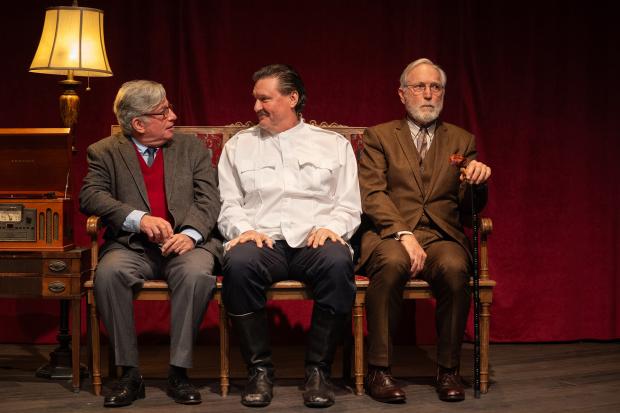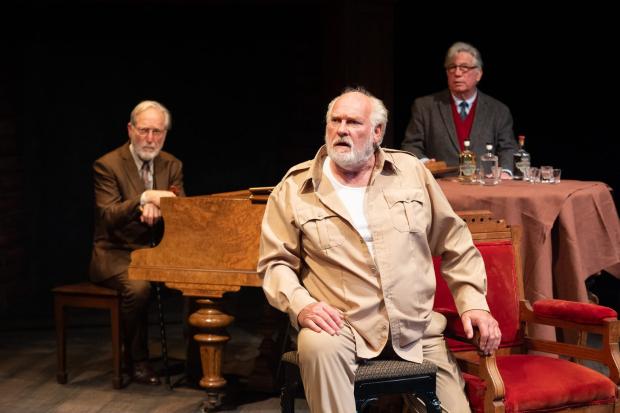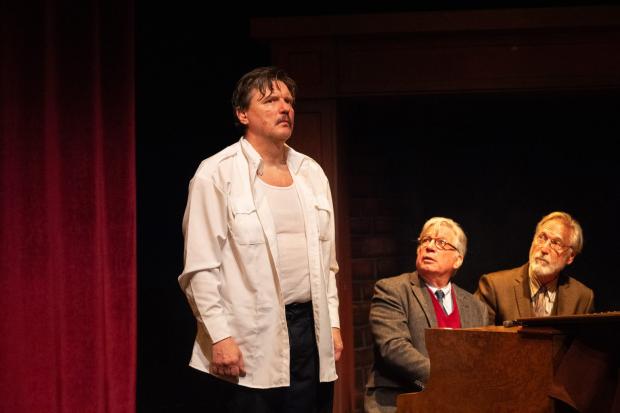Advertisement
In 1927 Sergei Eisenstein – the wunderkind of Soviet cinema, whose 1925 Potemkin swept the globe – was reportedly pressured to cut Leon Trotsky out of October, aka Ten Days that Shook the World, the film he was commissioned to make celebrating the tenth anniversary of the 1917 Revolution, by Joseph Stalin, who was then engaged in a faction fight with Trotsky and the Left Opposition. Almost 20 years later, after Stalin had butchered Lenin’s Central Committee, Eisenstein directed Ivan the Terrible to great acclaim, winning the State Prize of the Soviet Union – Stalinskaya Premia. However, Eisenstein’s sequel, Ivan the Terrible, Part II, was banned – the betrayer of the Russian Revolution realized that Eisenstein intended Ivan to be a not-so-subtle veiled reference to Stalin. Eisenstein never lived to see the release of his masterpiece in the late 1950s after Stalin’s death and Khruschev’s “thaw” opened the USSR up, because, it’s believed, that the Kremlin put so much pressure on the filmmaker that the 50-year-old suffered a heart attack and died in 1948.
One of Eisenstein’s other classics was another look back at Russian history, 1938’s anti-Nazi parable Alexander Nevsky, which also won the State Prize of the Soviet Union – Stalinskaya Premia and Sergei Prokofiev (Jan Munroe) composed the score for. The renowned Russian composer is one of the four characters depicted in the Odyssey Theatre’s revival of Stalin’s Master Class, by British playwright David Pownall, who was born in Liverpool the year Nevsky debuted. The play’s other characters are Prokofiev’s fellow composer Dmitri Shostakovich (Randy Lowell), the dreaded cultural commissar Andrei Zhdanov (John Kayton) and Ukraine-born Ilia Volok as Stalin, the USSR’s dictator and wannabe musician.
Pownall’s two-act production appears to be set in Zhdanov’s Kremlin office (by scenic designer Peter Hickok) during the crucial Moscow Composers’ Conference of Soviet musicians in 1948. The conceit of Stalin’s Master Class is a vodka-fueled all-night session between the two politicians and two composers that Pownall conjured up. Like some productions about Stalin, such as 1991’s The Inner Circle, 2017’s The Death of Stalin (released during the Russian Revolution’s centennial), and the current Showtime series A Gentleman in Moscow, Stalin’s Master Class contains a heavy dose of black comedy.
When Stalin betrayed the Russian Revolution, he not only targeted revolutionary politics by driving Trotsky into exile and later assassinating him (as was portrayed in a bad taste comedy staged at the Odyssey Theatre in 2013) and imprisoning and liquidating other members of the Left Opposition, including members of Lenin’s Central Committee. To carry out the dictatorial bureaucratization of the USSR and tamp down communist internationalist and domestic aspirations, Stalin also had to smash and tame the avant-garde culture that had been spawned by the Bolshevik Revolution, which, among other things, had provided state support for progressive artists – a rare convergence of radical government and talents. Zhdanov was a key official appointed as Stalin’s enforcer to carry out the purge of arts and artists of radical techniques, styles and their practitioners to ostensibly render the arts more accessible to and comprehensible by the masses with “socialist realism,” a form that was more representational (but wasn’t really socialist or realist, but that’s beyond the scope of this article).
This then is the subject of Stalin’s Master Class, as the eponymous tyrant and his henchman seek to browbeat Prokofiev and Shostakovich into abandoning “formalism” for more “folk”-oriented music for ordinary folks. Think Salieri on steroids, backed by ruthless state power, versus Mozart.
When Stalin enters, he is, surprisingly, extremely jovial, with a “hail-fellows-well-met” demeanor. But over the course of his all-night encounter, his emotions run the range and other sides of the personality of this brutal despot run rampant. He alternately cajoles, threatens, screams, cries, etc., as he and Zhdanov engage Prokofiev and Shostakovich in an attempt to jointly compose a musical composition that eschews the composers’ so-called “formalism.” The unpredictable Stalin’s temperamental character turns on a dime, and he comes across like a bi-polar Pol Pot, egged on by his cultural hatchet man, as the two coarse bureaucrats (who fancy themselves to also be artistes) seek to force the hapless musicians to compose a masterpiece that follows the party line, and which can be presented to the ongoing musicians’ conference. Of course, the entire session is being surreptitiously (at first) recorded by, presumably, the KGB.
Stalin rebukes Shostakovich for composing gloomy music and in an introspective moment of self-criticism, Dmitri confesses he has a “depressive” personality. Stalin wants him to dumb his music down so it will, instead, be “cheerful” for the postwar Soviet masses – not mournful of their losses of 20 million-plus compatriots during the Second World War, aka “the Great Patriotic War.” Prokofiev and Shostakovich may not have been politically revolutionary-minded like the avant-garde Eisenstein and the poets Sergei Esenin and Vladimir Mayakovsky, but they nevertheless had to be “cured” of their “formalistic tendencies.”
It is a case of the malevolent mass murderer mediocrities versus the magnificent maestros. [PLOT SPOILER ALERT!] In one especially chilling scene Stalin and Zhdanov go a on a smash and grab spree, running amok as they literally shatter albums, covering the stage in vinyl shards. I couldn’t help but think that Pownall was metaphorically referring to and visually embodying the term “record breaking.”
At another point, Stalin waxes poetic about wolves and howls at the moon. I couldn’t help but think that Pownall was alluding to Prokofiev’s famed 1936 “Peter and the Wolf,” Opus 67.
Venerable director Ron Sossi, virtually the Odyssey Theatre’s longtime Homer, admirably helms his colorful cast. As the frail Prokofiev and Shostakovich, Munroe and Lowell deliver skillfully etched performances that are alternately timid, tamed, proud and defiant. Kayton’s cultural commissar alternates between bullying the talents at his mercy and obsequiously flattering his superior. But it is the Ukrainian-born, volatile Volok as the vodka-swilling Uncle Joe, that “Man of Steel” from Georgia (no, not Marjorie Taylor Greene’s “Peach State,” but the onetime Soviet Republic), who steals the show. And if anybody disagrees with me, I’ll purge them and send them to a gulag in Siberia!
Coming hard on the heels of the death of Russian dissident Alexei Navalny, as May Day nears Stalin’s Master Class is extremely timely. This approximately two-and-a-half-hour, two-act thought provoking play with one 15-minute intermission (presumably enough time for a comrade to fortify him/herself at the concession stand with a shot of Smirnoff!) is perfect for politically engaged theatergoers, as well as for spectators who enjoy gallows humor and watching high drama on the live stage. However, those uninterested in the play’s politics and unfamiliar with its fact-based protagonists may find its tyranny tedious and too gabby about issues they don’t understand or care about. Listen and look for a sonic surprise offered by musical director Nisha Sue Arunasalam that is only revealed at the end in this play punctuated by live and some recorded music. And if you sit in the front row tovarich, beware the flying shattered shards of LPs!
Stalin’s Master Class runs Wednesdays April 17 and May 15 only at 8:00; Fridays and Saturdays at 8:00 p.m. and Sundays at 2:00 p.m. through May 26 at The Odyssey Theatre, 2055 S. Sepulveda Blvd., West Los Angeles, CA 90025. There are post-performance discussions April 17, April 26, May 5, May 15. For info: (310)477-2055, ext. 2; https://odysseytheatre.com/whats-on/stalins-master-class/.



